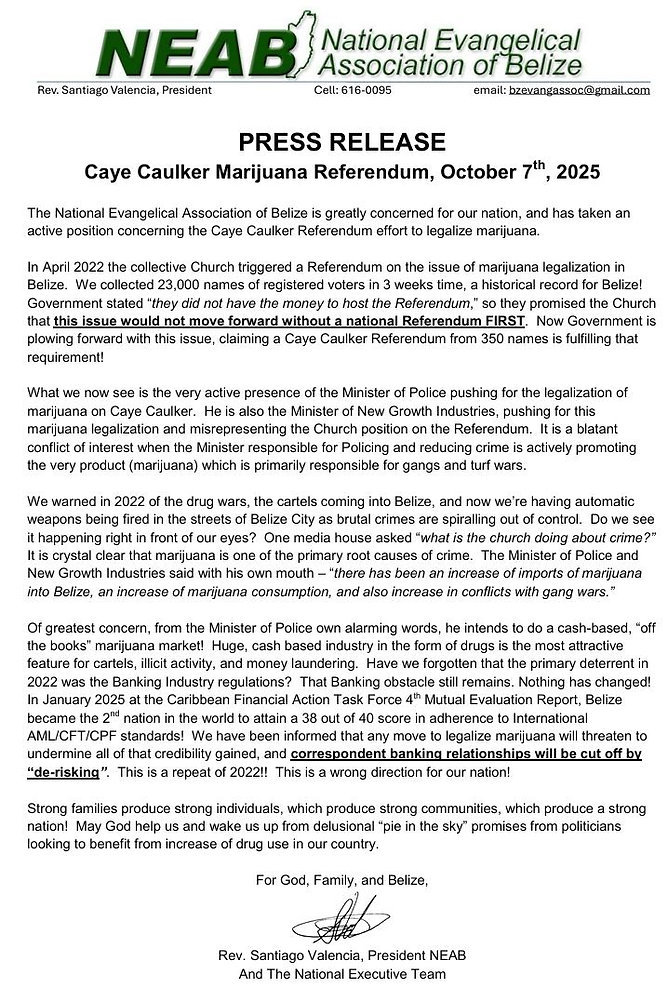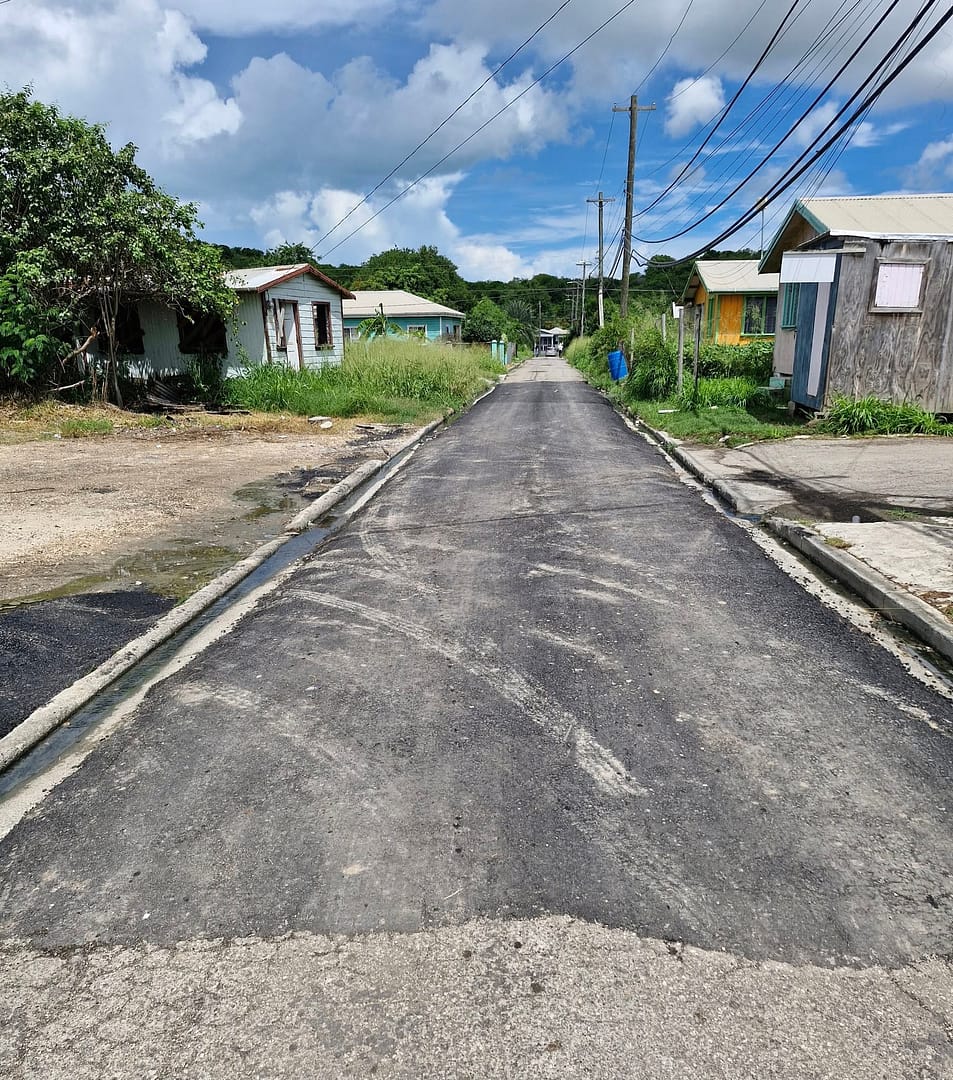The National Evangelical Association of Belize (NEAB) has voiced significant apprehensions regarding the forthcoming Caye Caulker Referendum on marijuana legalization. The Church contends that the government’s decision to proceed with a local vote contradicts its prior commitment to conduct a national referendum first. This development follows a historic grassroots effort in April 2022, when NEAB mobilized to gather 23,000 registered voter signatures in just three weeks—a record for Belize—to initiate a nationwide vote on the issue. At the time, the government cited financial constraints as the reason for delaying the referendum, pledging that no action would be taken without a national mandate. NEAB argues that the current local referendum, driven by a mere 350 signatures, violates this promise. The Church has also criticized the involvement of the Minister of Police, who oversees both law enforcement and New Growth Industries, including the promotion of marijuana legalization. NEAB labeled this dual role as a “blatant conflict of interest,” emphasizing the link between marijuana and escalating gang violence and crime in Belize City. The Church reiterated its 2022 warnings about drug-related violence and cartel activity, pointing to the recent surge in automatic weapon use on the streets. NEAB further highlighted the Minister’s acknowledgment of increased marijuana imports, consumption, and gang conflicts. Additionally, the Church cautioned that a cash-based marijuana market could foster illicit activities and money laundering, potentially jeopardizing Belize’s robust international banking reputation. In January 2025, Belize achieved a 38 out of 40 score for adherence to AML/CFT/CPF standards from the Caribbean Financial Action Task Force—a credibility NEAB fears could be undermined by legalization. The Church concluded with a call for societal vigilance, stating, ‘Strong families produce strong individuals, strong communities, and a strong nation. May God help us wake up from delusional promises by politicians seeking to benefit from increased drug use.’
分类: society
-

Caye Caulker Cannabis Revenue Model Projects Over $10 Million Annually
A groundbreaking proposal for Caye Caulker, Belize, suggests that legalizing and regulating cannabis production and sales could generate over $10 million in annual tax revenues, positioning the island as a pivotal hub for the nation’s cannabis industry. Conservative estimates indicate that local consumption alone could yield $413,000 annually, based on a price of $6.75 per gram plus tax. With a quarter of the island’s 2,729 residents consuming 10 grams three times weekly, total annual consumption would reach 979,200 grams. Tourism further amplifies this potential, as approximately 17,000 overnight visitors consuming at the same rate could contribute an additional $74,266.87 yearly. The proposal envisions Caye Caulker as the central point for all legally produced, tested, and sold cannabis in Belize. If just one-eighth of the national population—around 52,463 people—consumed cannabis at this rate, the country could earn an extra $10 million in tax revenues annually. However, the Roman Catholic Diocese of Belize City–Belmopan has voiced strong opposition, citing moral and spiritual concerns. The Church warns that legalization could normalize drug use, harm youth, damage families, threaten public health, and undermine tourism. The referendum, scheduled for October 8, will determine the island’s path forward.
-

Public encouraged to comment on new standards
The Grenada Bureau of Standards is nearing the completion of its initiative to establish updated national standards for toilet tissue and hollow blocks. The public is invited to review and provide feedback on the draft standards from October 6 to December 5, 2025. These new standards aim to replace the existing mandatory regulations for these products, ensuring alignment with international benchmarks and addressing modern manufacturing practices. For toilet tissue, the draft specifies that the product must be made from virgin, chemical, or mechanical pulp, or secondary fibers derived from recycled paper. The tissue must be unglazed, soft, flexible, and free from defects such as wood splinters, specks, or wrinkles. Similarly, the standards for hollow blocks emphasize proper curing to ensure the required strength before dispatch, with the Bureau retaining the right to conduct independent sampling. Amiesha Persaud, head of standardization at the Grenada Bureau of Standards, highlighted that the current standards, which have been in place for many years, no longer reflect the latest international norms. She noted that manufacturers and other stakeholders were actively involved in the review process. The draft standards and comment forms are available on the bureau’s social media platforms, with submissions accepted electronically or via email to the Director by December 5.
-
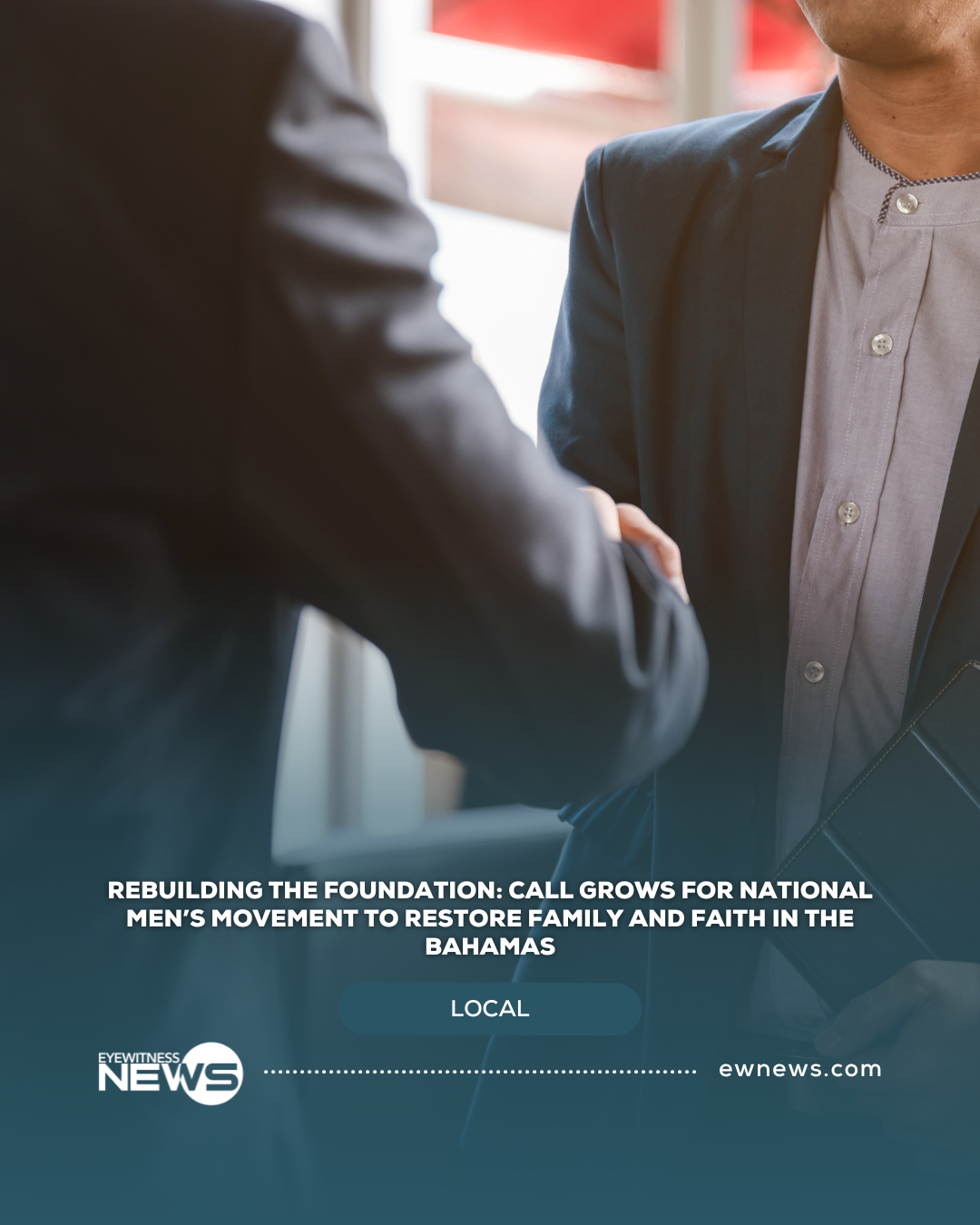
Rebuilding the Foundation: Call Grows for National Men’s Movement to Restore Family and Faith in The Bahamas
The Bahamas, a nation celebrated for its beauty and culture, is grappling with a profound societal issue: the alarming absence of strong male figures in families and communities. This crisis, deeply rooted in the decline of traditional family structures, has far-reaching consequences for the nation’s social fabric. Statistics reveal that 65% of live births in The Bahamas are to single mothers, with fathers often absent or unacknowledged. This phenomenon has led to generations of young men who are disengaged, directionless, and, in many cases, a threat to society. Many end up as high school dropouts, incarcerated, or tragically lost to violence or justice evasion.
-
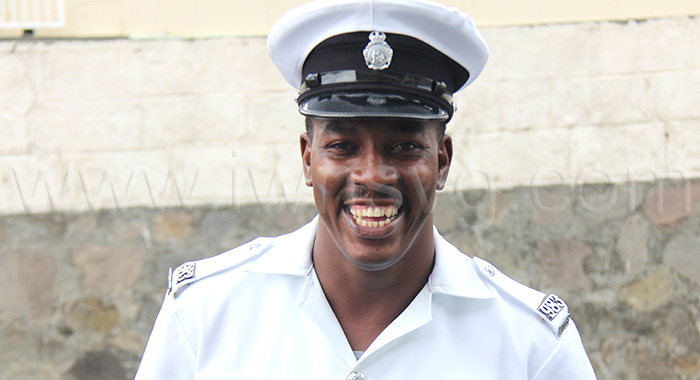
Cop summoned by defence contradicts Too Cool’s evidence
In a dramatic turn of events during the trial of popular DJ Christopher ‘Too Cool Chris’ Jones, a police officer’s testimony has contradicted the defendant’s account of a shooting incident in Kingstown. Police Constable Jahshem Lynch, who was summoned by the defense, testified that he witnessed the shooting but disputed crucial details provided by Jones. Lynch stated that Jones did not cross the street during the incident nor stand over the victim after firing three shots, directly opposing Jones’s claim of self-defense. The prosecution has argued that the shooting was malicious and that Jones should be found guilty. Senior Magistrate Tamika McKenzie is expected to deliver her verdict on December 10, though she may announce it earlier. Lynch, who has served as a police officer for eight years, provided two statements regarding the incident. He recounted hearing a death threat from the victim, Kevin Patterson, moments before the shooting occurred. Lynch also described the chaotic scene that followed, including the gathering of a crowd and the arrival of other officers. Despite his detailed account, Lynch admitted he did not report the shooting immediately and only prepared statements upon request. The trial continues to unfold as both sides present their evidence, with the court awaiting the final decision.
-
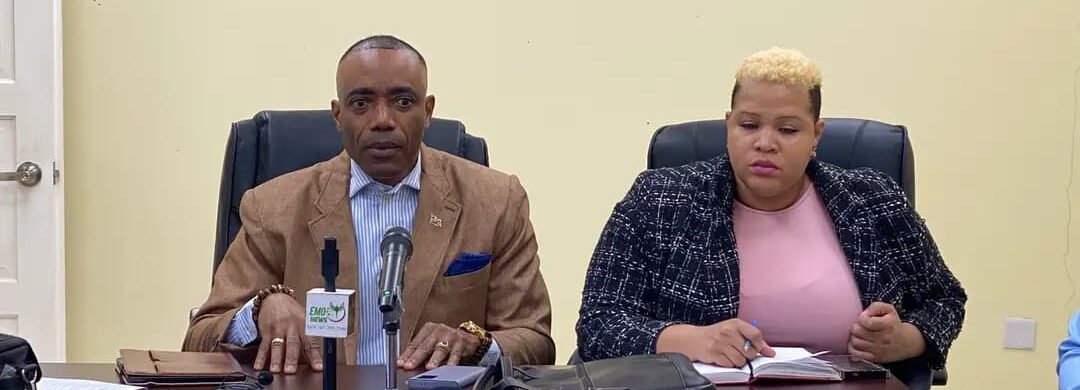
Dominica Met Services has best infrastructure in OECS, says blackmoore
Eight years after the catastrophic Hurricane Maria, Dominica has emerged as a regional leader in meteorological infrastructure within the Organisation of Eastern Caribbean States (OECS). Minister for National Security Rayburn Blackmoore highlighted this achievement during a walk-through ceremony at the Office of Disaster Management Building in Jimmit on Monday. The event was organized to showcase the significant progress made in meteorological forecasting and disaster management since the hurricane devastated the island in 2017. Blackmoore emphasized the importance of recognizing advancements, stating, ‘Let us not underestimate the progress we have made. Eight years after Hurricane Maria, we have the best Met Services infrastructure in the OECS.’ He noted that Dominica now boasts a standalone meteorological headquarters, a project initiated in 2019, which surpasses the facilities of neighboring countries that often operate from airports or smaller offices. Blackmoore stressed the critical role of well-equipped meteorological services in achieving Dominica’s goal of becoming the first climate-resilient nation. ‘We must have the prerequisite resources in personnel and equipment to better forecast and issue warnings,’ he said. The minister also highlighted the country’s investment in automatic water gauges and other advanced tools, which have reduced reliance on external entities for weather alerts. ‘No one would have thought that Dominica would be the first in the OECS to have a dedicated Met Services building,’ Blackmoore remarked, underscoring the island’s remarkable transformation since Hurricane Maria.
